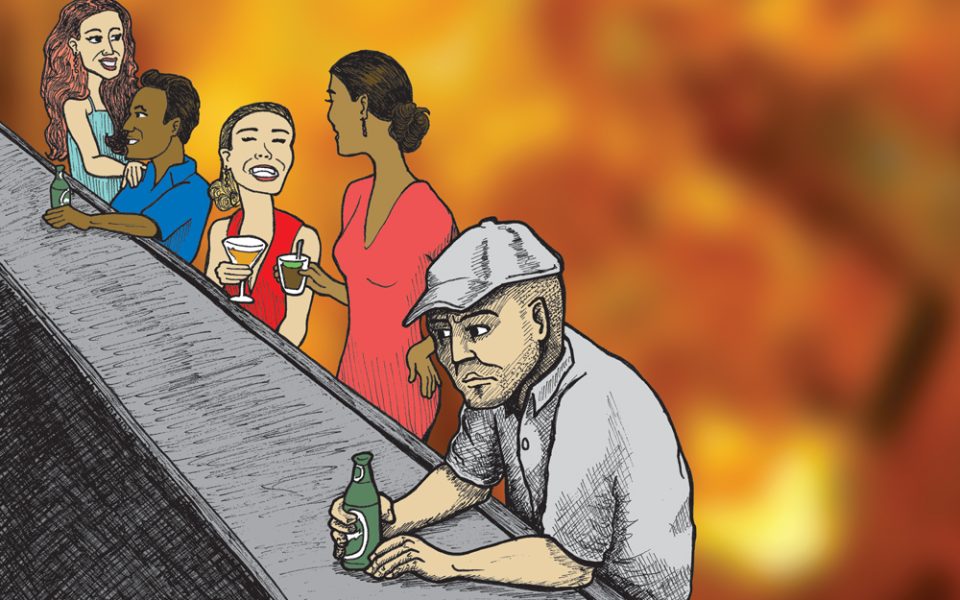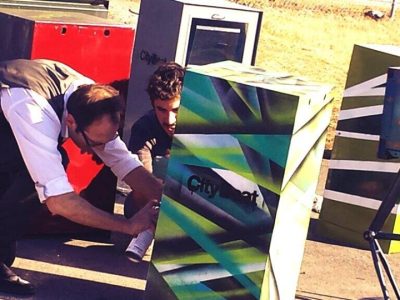It was just another press release from the Greensboro Police Department, one of the dozen or so that come through my inbox every week — more gruesome than most, but otherwise fairly routine. This one was about a dead body.
“The incident occurred at about 9:15 a.m. Thursday, July 31, as a northbound Norfolk-Southern freight train approached the intersection in the vicinity of 4727 Hilltop Road near the DH Griffin Companies. A witness reported that the adult male circumvented the drop arm bar at the railroad crossing and stepped onto the tracks as the train approached. The man has not yet been positively identified. No other persons were involved or injured in this incident.”
Poor bastard, I thought to myself.
I didn’t know until a few hours later that the poor bastard in question was my friend, Steve.
The News & Record had the story the next day, identifying Steve by his age, 49, with the qualifier “a man of no permanent address,” though the piece went out of its way to assure readers he was “not homeless.”
The old Steve probably would have laughed at that. The Steve I talked to a couple weeks before he sacrificed himself to the Norfolk-Southern Line seemed incapable of laughing at anything.
“I’m screwed, bro,” he told me.
I hadn’t hung out with him in a long time, hadn’t called him in the middle of the night or popped by his house in the early evening, hadn’t searched him out in a bar or made him my plus-1 at an event since I got sober years ago and just couldn’t bring myself to be around him all that much.
Because what the news and police reports did not mention is that Steve was a drug dealer. But that doesn’t ring completely true. Drugs sell themselves. Steve was just one of the guys who always had them.
***
I’m writing this story for several reasons, some of which have to do with me, and the many paths I’ve walked in this life, and the many more I hope to be fortunate enough to traverse. I’m writing it for Steve, too, and others like him who stay in the game so long they can never get out.
I know some readers will stop right here, and that’s fine. Not everyone wants to read a eulogy for a drug dealer.
But I need to write one, because Steve was my friend, and that’s the truth.
It’s true, too, that there are really only two possible end games for guys like Steve: death or institutionalization.
I suppose, it’s a good thing that Steve got to choose. Doesn’t feel that way though.
***
In December 2013, a Guilford County Sheriff’s officer slipped into Steve’s neighborhood of curved streets and sensible homes. He confiscated three bags of trash from outside of Steve’s house, and brought them back to the station to go through them.
He found an empty container of inositol, a carbohydrate with about half the sweetness of sugar that a lot of street pharmacists use to fatten their stashes. You can get it at GNC.
He also found a couple of small baggies dusted with cocaine residue, which was enough to secure a search warrant for the premises. It was executed on Feb. 24. Steve was home when they came for him.
***
Six-and-a-half grams of cocaine in small bags, another gram in what the report calls a “tooter,” a bullet-shaped device that enables the user to ingest a quick charge of the drug. Half a gram lying about his room, and another 14 grams in the nightstand. A big bag with 62.5 grams was the worst of it. A scale and a coffee grinder coated in cocaine and inositol. There was also about a thousand dollars in cash, and a Smith & Wesson .44 with a box of ammo. That’s what they found on Feb. 24, while I was readying the first issue of my new paper for the streets.
I had no idea, not until he called me months later. That world that was once so familiar to me exists on a different plane than the one I now inhabit.
***
Every bar has a guy like Steve — every bar I’ve ever worked in, anyway. They’ll come in around midnight and make heads turn all over the room, take a seat at the bar or maybe a table in the corner and take audiences of one or two at a time.
Biker bars have guys. Neighborhood taverns have guys. Karaoke bars have guys. Nightclubs have guys. After-work drinking holes have guys. I even know of a country club on Long Island that has a guy.
I remember Big Nasty and the Psycho Cowboy from down in New Orleans, and Sweet Greg in the French Quarter.
I remember, too, One-Eyed Joe, who used to drink with me at Igor’s in the early morning while I wrapped up my graveyard shift.
He really did have just the one eye. The other he lost in a bar fight in that very room, after getting punched in the face by a fist holding a broken mug handle. That was back when he used to be the guy.
In his old age, One-Eyed Joe wasn’t much of anything: sickly, alcoholic, not quite homeless but definitely not socially secure.
But man, that dude could make me laugh. He still had his sense of humor. At least he still had that.
***
The United Nations estimates that the international drug trade is a $600 billion per year industry, more than the gross domestic product of Argentina. But not much of that dough trickles down to the guys like Steve. Independent retailers, according to a 2000 study by the University of Chicago, make upwards of $30,000 a year.
Steve was probably doing a little better than that, but he definitely was not rich. He had a simple wardrobe, drank Dos Equis and shaved his own head. He’d get out of town a couple times a year, maybe to the beach or the casino in the mountains. He wore no bling.
On May 27, just a few months after the raid on his house, Steve filed an affidavit of indigency to qualify for a pubic defender. He listed his monthly income as $400, his only possessions a 1995 Honda Accord and a house he bought in 1994 for $90,000 that he still owed half on.
On the debit side of the ledger he reported a balance due to Cone Hospital of $69,000.
***
He’d been paying that debt down for years. It must have been 2008 or ’09 when he called me from his sickbed, absolutely frantic, scared in the way only a man who is directly addressing his own mortality can get. It was a spider bite or something that had blistered his forearm, he said, and had begun eating away the flesh around the wound. The doctors, he said, were stumped.
“I think I could die here,” he said.
I can’t remember what I brought when I visited him there — might have been booze, might have been porn — but I do remember how glad he was to see me. He had been in there for days, all by himself, playing out worst-case scenarios. I think I talked him down a little, and I told him I would feed his cat.
***
Steve was indicted by a grand jury on May 5, and lost his house, as I understand it, in order to secure his bail, set at $40,000. By this time he had very little income. He had been an electrician by trade, but that was a long way in the rear-view, I suspect. His years off the financial grid meant he had not paid much into Social Security or filed meaningful taxes. Huge gaps in his résumé stymied any attempt at gainful employment. And by necessity he kept late hours, cruising the spots where his customers gathered to deploy product.
The nuts and bolts of his work he did alone: hours upon hours of weights and measures, doling out small piles of powder, packaging them in little bags and twisting them off, stashing them in pockets, matchbooks, socks, cigarette packs, suiting up and hitting the bars just before the night hits its climax, rain or shine, and taking on the customers in parking lots, in bathrooms, in cars with the interior lights on, slipping them the goods, pocketing the cash, keeping a rough count of what comes in and what goes out, staying wary of new faces who might be cops or might be hijackers, checking texts, driving the speed limit, never getting to stay for the band’s final number. It’s a business, man, and demand stays strong no matter what the supply.
And while many of these skills can apply in the regular working world, there’s really not much out there for a drug dealer looking to move on. Good luck finding a career for which knowing the metric system is a qualification.
***
Most retail drug dealers are alone. It’s not the kind of trade that meshes well with a romantic relationship. Child rearing would be almost impossible. It’s imperative to keep a false front for the squares — a sort of semi-permanent state of deceit — and it’s difficult to ascertain whether customers are true friends or just hanging around the Guy who Brings the Dope long enough to make the transaction and a little small talk before running off to hit it.
It requires suspicion and isolation. It becomes difficult to trust.
***
Steve was my friend. We saw the Black Crowes together in Raleigh and Yes at the Carolina Theatre. He finished reading my book the day after it came out, and I know he was proud of me. He told me so.
Like me, he was from Long Island, with a working-class ethic and still just a touch of the accent even after almost 30 years of living in Greensboro.
He was a lover of cats and a patron of the arts, a terrible poker player and a loyal friend.
When I stopped coming around, he didn’t take it personally. He was proud of me. He told me that too.
I wish I could have been a better friend to him.
***
I talked to Steve June 24 for the first time in more than a year; that’s when he told me everything. He was terrified. Destitute. Unable to sleep. He desperately wanted someone to blame. His two counts of trafficking each held a mandatory minimum of 35 months. The specter of prison haunted him, and nothing I could say or do would console him. The thought that he might have a panic-induced heart attack played across my mind. I worried for him.
I didn’t hear from him again until July 21, the day he found out that he would most certainly be going to jail — he would find out his sentence on Aug. 11, this past Monday. He relayed this information by text message.
“It’s so fucked up,” he wrote. “1 more continuance, then jail. My credit ruined, homeless, etc…. FML.”
Scrolling through my texts just now I saw that I never replied to this message. It shames me.
Ten days later he waited in the woods by the tracks. Maybe he smoked a couple of cigarettes — he was always trying to quit. When he heard the distant rumble of the freight, he readied himself. As it approached he picked his moment — not too soon or he might lose his nerve, not so late that he wouldn’t make it to the tracks in time. At the engine’s approach he slipped between the barriers and laid himself across the tracks on Hilltop Avenue. The freight train did the rest.
***
A part of me is angry with Steve. He could have sucked it up, paid his debt to society and straightened out his life. A lot of us would have been real glad to see him when he came out. I wanted him to have been stronger.
I wish I had been stronger, too — strong enough to convince my friend that he would make it, that everything would turn out okay, that a few years in jail would be preferable to taking his troubles down to the train tracks and saying goodnight.
I’ve been taught not to regret my past, and though it is riddled with mistakes and bad decisions, I can say that I genuinely do not.
But there are ghosts that will stay with me forever. Steve is just one of them.
So it is without a sense of permanence that I say goodbye, old friend. I wish I could have done you better.
Join the First Amendment Society, a membership that goes directly to funding TCB‘s newsroom.
We believe that reporting can save the world.
The TCB First Amendment Society recognizes the vital role of a free, unfettered press with a bundling of local experiences designed to build community, and unique engagements with our newsroom that will help you understand, and shape, local journalism’s critical role in uplifting the people in our cities.
All revenue goes directly into the newsroom as reporters’ salaries and freelance commissions.





all too familiar, this is beautifully written eulogy.
Great, tragic read, Brian.
Nice read Brian. Really nice.
For Steven John Mierjeski
Do not stand at my grave and weep,
I am not there, I do not sleep
I am a thousand winds that blow,
I am the softly fallen snow
I am the gentle showers of rain,
I am the fields of ripening grain
I am in the morning hush,
I am in the graceful rush
Of beautiful birds in circling flight
I am in the star shine of the night
I am in the flowers that bloom,
I am in a quiet room
I am in the birds that sing
I am in each lovely thing
Do not stand at my grave and cry
I am not there, I did not die.
https://fbcdn-sphotos-a-a.akamaihd.net/hphotos-ak-xfp1/t1.0-9/s261x260/10590464_10152606186647287_3585523201206860208_n.jpg
https://fbcdn-sphotos-g-a.akamaihd.net/hphotos-ak-xaf1/t1.0-9/q87/s261x260/10590521_10152606193697287_4931855967494400171_n.jpg
https://fbcdn-sphotos-e-a.akamaihd.net/hphotos-ak-xfa1/v/t1.0-9/10606375_10152614930342287_5446454267870797355_n.jpg?oh=ec9195f87b5b1be14477c9d673d99b12&oe=547621FD&__gda__=1417817616_ae9db26eab20e057e187b23bd98967d2
Sorry for your loss. Great read about a tragic end to a life.
While this article is well written,it is also selfish and inappropriate.
Who are you to reveal someones private affairs so soon after their death.
Did you think of his family or friends who might be unaware of his lifestyle?
Most of us would like to remember our loved ones in a better light than the
picture of Steve’s life that you have painted.
I myself have known Steve for 30 years.This article is not the message
I would convey to his family or friends.
One last note.It’s sounds as if your in some type of recovery,so I will remind you
of the 9th step.
9 Made direct amends to such people wherever possible, EXCEPT when to do
so would injure them or Others.
Goodbye Steve
JMB
Joe, I believe Steve’s arrest and upcoming incarceration would speak to his lifestyle, if any of his family didn’t know, and/or how could they not know? I know neither Brian nor Steve, but my feeling after reading this article is there was no unkindness meant. Rather an opening by Brian to look inside a friends life who got stuck where he couldn’t find his way out, and a view inside his own past which he owns. I actually felt Brian’s regret of turning away from a friend when he could have reached out. That’s the message I got.
Well written. I know it had to be difficult to out yourself AND your friend…but there’s power in lies and deception…truth releases us. Great read!
Awful
Great story. Reminds of the classic novel, “The Man with the Golden Arm”.
I agree with Lynn…not intended to harm anyone and if the family didn’t know…they were in serious denial. I have talked to parents who have lost children to suicide and they said that they need to ask themselves what they could have done so that we can all learn from it.. to help prevent these tradgeties from happening to other parents / families. That’s what this artilcle said to me. I have been in recovery for several decades and understand the traditions well. You are the one who broke with tradition, as you would only know if you were in a program yourself not the other readers. This is not a violation of any traditions. Bill Wilson’s name is well known to the public now that he is passed. I wish to god that I had reached out and continued to reach out to my son’s best friend who was a drug dealer and who got my son into some heavy drug use. You think I would be bitter about that but I get it. He blew his head off because he felt helpless and hopeless.
It is not as cut and dry as you think. Our industries have dried up across the country and everyone is struggling to survive and unfortunately many turn to sales…drug sales. Luke’s (my son’s best friend) death has caused be to be more honest and genuine with people than I have ever been in my life. It broke my heart and it could have been my son just as well as him. My son is clean as a result but I didn’t want it to be at the expense of someone else’s child.
Reads as an honest and heartfelt tribute to your friend; deepest condolences.
It bears noting, that not only “The freight train did the rest,” but so did the freight train’s conductor. Another person’s life was harmed by Steve’s choosing to end his the way he did.